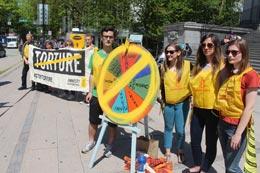Torture must end, says Amnesty International

Don Wright,
Special to The Post
What happens in the dark must come to light. Amnesty International has launched a worldwide campaign to stop torture. Governments everywhere have betrayed their commitment to stamp out torture, a commitment they made three decades ago with the Convention Against Torture. Now activists here in Metro Vancouver and around the world will be pressuring governments to end a practice that is prohibited in international law but happens in secret.
They must ensure that torture is criminalized in national legislation, that detention centres are open to independent monitors, and that interrogations are recorded on video. Protective measures such as ensuring proper medical examinations and prompt access to lawyers must be enacted. Simple interventions can eliminate the opportunity for torture and ill-treatment.
Torture and other forms of ill-treatment have been reported by Amnesty International in at least 141 countries over the last five years.
One such case is that of Alfreda Disbarro, a single mother in Barnagay San Antonio, Paranaque in the Philippines. Disbarro was picked up by police officers at an internet café in October 2013 and accused of being a drug pusher. At the police headquarters she was punched, hit with a club, had her head banged against the wall and was beaten with fists and a wooden stick. The next day at a court building the police produced money and drugs, photographed her with evidence and forced her to sign a blank sheet of paper. When she was charged five days later, the prosecutor did not ask what the police did to her. After a complaint to the Commission on Human Rights, a medical examination concluded she had suffered injuries from blunt, hard objects and recommended examination for internal injuries. Alfreda Disbarro still remains in a local jail awaiting trial.
In some countries torture and ill treatment are routine and systemic. In others it is isolated and exceptional. It is all unacceptable. The international human rights framework binding nations is unequivocal. No one shall be subjected to torture. And no exceptional circumstances justify torture. Governments accepted the ban because they know torture does not work. People being tortured will say anything to make it stop.
Despite the fact that torture and ill treatment contaminate the entire legal process, it is still used as punishment, to get confessions, to implicate others or to obtain information. It can be used to spread fear, force people into silence and terrorize communities.
The Stop Torture campaign covers the world, but will focus on five countries in which torture is rife and where Amnesty International believes it can have a significant impact: Mexico, the Philippines, Morocco and Western Sahara, Nigeria and Uzbekistan. Over 130 other countries have been implicated in torture and others forms of ill-treatment along with these five nations.
Canada is not immune to scrutiny for its own practices with other countries. Canadian judicial inquiries and court rulings have made that clear in the cases of Mahar Arar, Omar Khar and others. Torture was also the central issue in the controversy about Afghan prisoner transfers by Canadian forces. Canada still allows deportations in certain cases to countries where there is a possibility of torture.
Government departments in Canada have also received directives that authorize the use, under exceptional circumstances, of intelligence obtained through torture in other countries.
While Canada has turned a blind eye to the use of torture by others, it has also failed to show leadership in the international effort to stop torture. It has not signed on to an Optional Protocol to the Convention Against Torture to allow prison inspections to help prevent torture. It is hard for Canada to challenge others to sign on to the protocol when it has not done so itself.
Local Amnesty International members will be taking direct action during the campaign to get countries to Stop Torture everywhere. And that includes Canada's complicity.
Don Wright is the Vancouver-based activism coordinator for Amnesty International Canada.
Leave a comment









